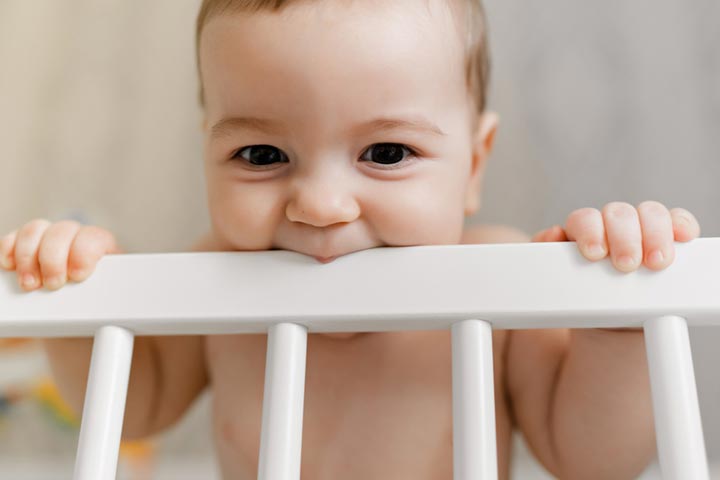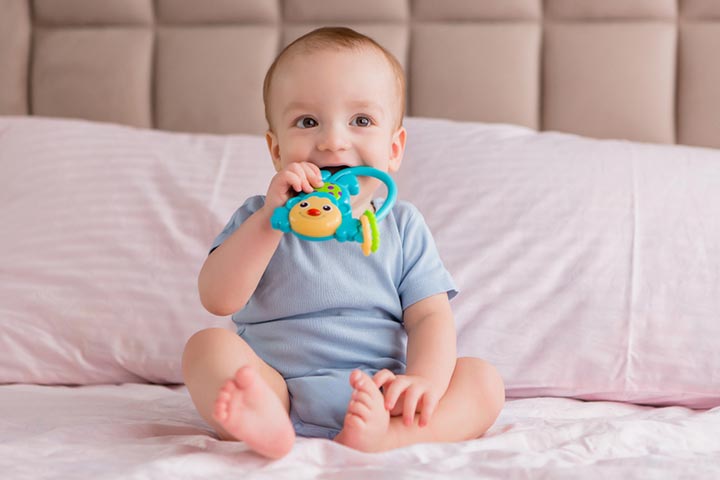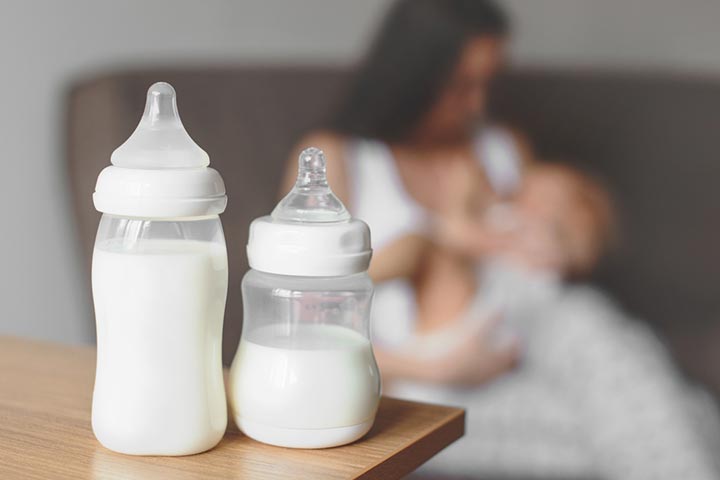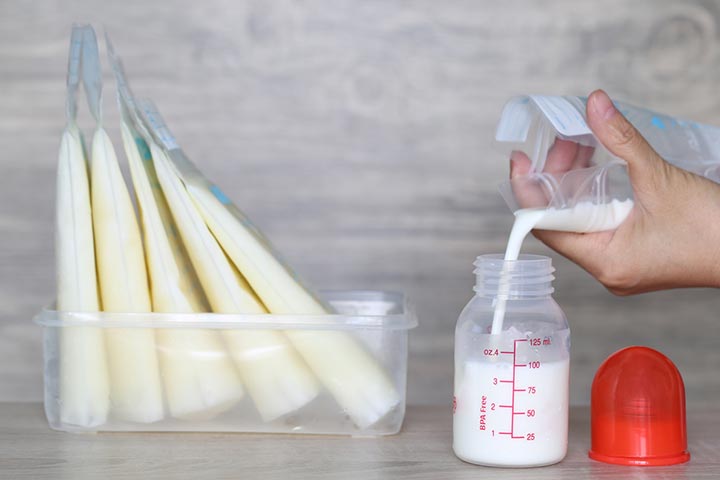You may find that your baby bites while nursing. If you are wondering how and why your baby won’t stop biting while nursing, this post is for you. Breast biting by the infant while nursing is unpleasant, and many mothers may misunderstand it as a sign that their baby is ready to wean. However, you should continue to breastfeed your baby exclusively until he or she is six months old. You can try various methods to keep your infant from biting your breasts. However, if they bite frequently, you should seek medical advice or call a lactation specialist. Read on to know more.
Why Does A Baby Bite While Nursing?
There are various reasons for baby biting while nursing. Sometimes, improper latching and position can make the baby’s teeth press against the breast, and you might feel as if the baby is biting.
Here are a few reasons why the baby might bite while breastfeeding (1):
- Teething: Sarah, a mom blogger, experienced her son’s biting behavior while nursing and later identified the reason. She says, “Tooth number 8 popped through overnight, and once I noticed it, everything made sense. Ayden(her son) has been going through a biting stage while nursing over the past few weeks, and then last night, he wanted to nurse and nurse all night long. He usually nurses for a bit and then rolls away for a few hours. Last night, he wanted to pacify all night long (i).” Sore gums due to teething can be one of the most common causes of biting. A baby may bite to relieve the soreness of the gums.
- Too little breastmilk: Babies can become frustrated when there is a low milk supply and might resortto biting.
- Too fast milk flow: Babies may become overwhelmed by fast milk flow or overactive letdown of milk, and may bite accidentally.
- Boredom: Distracted or bored babies may bite unknowingly.
- Attention seeking: Sometimes, babies may bite when the mother is not sustaining eye contact or is talking to someone else.
- Fall asleep: The baby may unknowingly clasp their jaw on the nipple when they fall asleep while breastfeeding. It is good to take them off the breast if they fall asleep while nursing.
- Ear infection or cold: This may interfere with swallowing and sucking and lead to biting.
If you suspect the reason behind the biting to be a cold or infection, then see a pediatrician. It is also good to see a doctor or lactation consultant if the reasons seem to be inadequate milk production, strong letdown, and poor latch.
How To Stop A Baby From Biting While Nursing?
There are variousways to prevent ababy from biting nipples
There are various ways to prevent a baby from biting nipples. You may try any of the following tips to stop your baby from biting, depending on the cause (2) (3) (4) (5).
- Say “No” when the baby bites: Say “No” or “No biting mommy” in a calm and firm voice if they bite the first time.Continue to feed the usual way. Do not shout since it may frighten the baby and may cause breast refusal (nursing strike).
- End nursing: If your baby bites repeatedly, then say a firm “No”, and end the feeding. This negative reinforcement method might help your baby understand that biting is not acceptable. You may calmly take them off the breast until they learn to feed without biting. During this phase, you can feed expressed milk to the baby.
- Offer something to chew: Biting can be reduced by offering something to chew before nursing. You may give them a chewing ring or a cold or wet clean cloth. This method can be especially helpful for teething babies.
- Pay attention: Paying attention to your little one while nursing may help reduce biting for attention-seeking. Try to give them warm touches and look at them while feeding. Always ensure that your baby is actively sucking and swallowing breast milk. The likelihood of biting is low during active infant feeding.
- Do not feed when they are lazy or sleepy: Lazy or sleepy babies do not latch well. A shallow latch may increase the chance of accidental biting. It is best to feed the baby when they are alert so that they can feed actively.
- Ensure a proper latch: Your baby’s lips should open wide while the tongue should cup around the nipple. The tongue will also cover the gums in a good latch, and, thus, may prevent biting. If your baby has trouble establishing a latch, then place the baby as close to the breast as possible. You may also use a nipple shield to help your baby establish a proper latch. The tongue will cover the baby’s gums during a proper latch and positioning. It is not possible to bite while actively feeding.
- Change feeding position: If nipping continues to occur, then you may try to change the feeding position. Try reclined or laid back breastfeeding positions to reduce scratches from baby teeth.
- Keep a finger near their mouth: This may help remove their latch easily when they start biting.
- End feeding when the suckling is slow: Most babies start chomping or chewing at the nipple at the end of nursing when the milk flow is slow. You may end feeding when they start sucking slowly.
- Feed frequently: Frequent feeds help maintain milk flow and reduce the chances of biting.
- Express milk: Some mothers express milk at the beginning of feeding if they have a slow letdown of milk, to get the flow going faster.
Baby biting can be controlled and prevented with simple measures. Switching to expressed milk is not an ideal way to cope with nipple biting. You may seek advice from a board-certified lactation consultant for personalized strategies to handle baby biting during breastfeeding.
Unexpected baby bites can be temporary. Keep the baby as close to the breast as possible so that they can open their mouths wide. Also, take a biting baby off the breast gently. If you suddenly push the biting baby away, then they may bite even harder.
Teething: Is It The Time To Wean?
Teething is not a sign to start weaning your baby. The World Health Organization recommends six months of exclusive breastfeeding with no other foods or liquids (including water) (6). The baby can be given solid foods after the age of six months, along with breastfeeding, which can continue up to two years or beyond for optimal growth (7).
Usually, babies begin teething around six months of age (8). Some babies may be born with one or more teeth, known as natal teeth. In some babies, teething can happen even at 12 months. Since teething can happen earlier or later, it is not an indication of weaning your baby.
Nipple Damage Due To Baby Biting
Experiencing nipple pain is common when nursing a baby, and while severe damage from baby bites is rare, a sudden bite in the nipple area can be quite uncomfortable. Sometimes, a baby could bite harder when pushed off the breast while biting. In such cases, there is a chance of skin damage, leading to cracked nipples.
Bite breaks on your nipples can lead to infections if you are not taking care of them. You might try the following tips if your baby bit your nipple while nursing.
- Clean the skin with saline water to reduce pain
- Apply ice or cold packs for pain
- Use nipple creams
- Nurse with undamaged (opposite) breast
- Express milk until the wound heals
If the pain continues, then take over-the-counter pain relievers such as Tylenol after discussing it with your doctor. Always ensure that you are taking medications that are safe during lactation. A board-certified lactation consultant can help you figure out the need for pumping and recommend some best breast pumps.
There are many reasons why a baby bites while nursing. The key to reducing this act is by finding a solution. Start by checking your latching technique, followed by the breast milk production and speed of their milk consumption. In case these are the issues, you may seek the help of a lactation consultant. However, consult your pediatrician for the solution if the biting is due to teething or other health conditions. If the biting has started to hurt your nipples and hinders your feeding routine, use creams and take pain medications upon the doctor’s approval.
Key Pointers
- Teething, boredom, or improper milk supply are possible reasons why babies may bite while nursing.
- Feeding frequently, paying attention, and setting limits by saying “No” to a baby may help prevent biting.
- Biting or teething should not be viewed as a reason to start weaning a baby.
- To manage the pain and nipple damage, nipple creams, cold packs, and cleaning the skin with saline solution can be helpful.
Embrace the significance of breastfeeding as an integral part of parenting, as the video outlines exclusive tips designed to make this beautiful experience easier for you.















